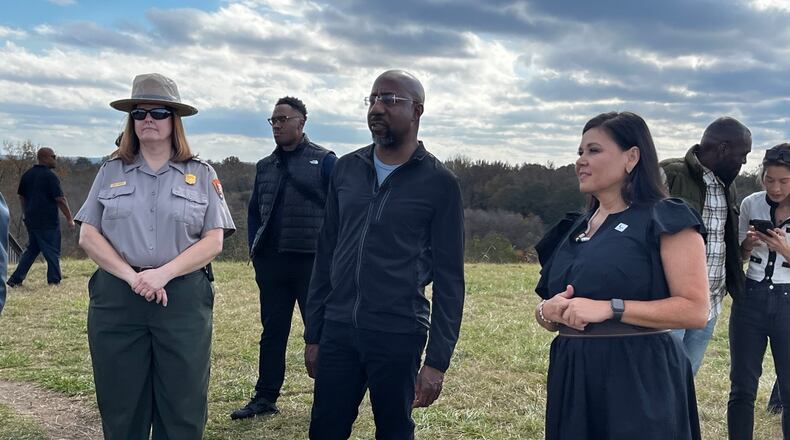MACON — It’s called the Great Temple Mound, and it soars above downtown Macon at the center of what once was a thriving Native American civilization in Middle Georgia.
Now remnants of this ancient heritage dot the Ocmulgee Mounds National Historic Park, along with trappings of modern-day culture: ruins of factories and homesteads, a railroad that cuts a deep gash through the land, creeping development in nearby subdivisions.
It’s also the center of another contemporary feature: a long-running political fight to create Georgia’s first national park and preserve.
But unlike so much else in Washington, this effort is a bipartisan one. And it will test the clout of Georgia’s congressional delegation, along with other initiatives to deepen Savannah’s port and win more infrastructure funds.
On Monday, U.S. Sen. Raphael Warnock visited the historic grounds on the east bank of the Ocmulgee River to see for himself. After a mile-long hike to the towering mound, which rises nine stories high, the Democrat took stock of what he called a “living testament to our intertwined histories.”
“To spend time on this land is to take seriously the complicated American story. So much rich culture. So many stories of a resilient people,” Warnock said. “We’re standing on holy ground.”
‘How stuff gets done’
For decades, Georgia lawmakers have sought to more than double the footprint of the roughly 700-acre park, with dreams of one day preserving as much as 50,000 acres.
Their vision requires a federal designation as a national park and preserve, something that has united Democratic U.S. Rep. Sanford Bishop and Republican U.S. Rep. Austin Scott, along with Warnock and U.S. Sen. Jon Ossoff.
They were dealt a mild, but not surprising, blow last week when the National Park Service released a study showing that a broader plan for parkland stretching from Macon to Hawkinsville is suitable for federal protection but not feasible because of all the private and state-owned lots along the path.
It recommends forging a greater partnership with the Muscogee Creek Nation to preserve a smaller area along the Ocmulgee as a next phase. And it made clear that the National Park Service is “ready to work with Congress to ensure that these resources can be appropriately and best protected.”
Seth Clark, Macon’s mayor pro tem, said important steps are already underway. And he’s confident the delegation will land more federal help.
“Middle Georgia is grateful for the long-standing bipartisan commitment to this project, but we’re not surprised by it,” he said. “That’s how stuff gets done here.”
He was echoed by Tracie Revis, who told Warnock on Monday how her Creek ancestors were forcibly removed to Oklahoma by federal troops in the 1800s.
“As the ancestral people to this land, the tribal voice should be one that is elevated,” she said after leading Warnock on a tour of the area. “Creating this park and preserve and allowing the Muscogee Creek Nation to serve as a co-manager helps restore balance.”
Bishop said lawmakers are devising ways to address the study’s concerns, though they have no timetable for the legislation. He also called the fate of the site personally meaningful, noting an emotional meeting with a Native American leader who helped reinforce the need for expanded federal protection.
“We need to do whatever we can to recognize and preserve the heritage of the Muscogee Creek Nation,” said Bishop. “And this is another step toward making that happen.”
Warnock seemed particularly moved.
“This has been 100 years coming. It’s part of a long journey,” Warnock said. “And the only way it gets done is if there’s bipartisan work to make it happen.”
About the Author
Keep Reading
The Latest
Featured







